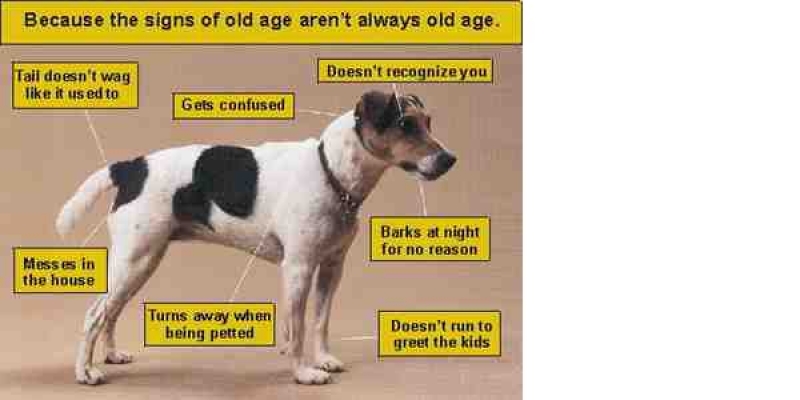Doggy Dementia
Also known as Canine Cognitive Dysfunction and Cognitive Dysfunction Syndrome, Doggy Dementia has many parallels with early human Parkinson's disease and Dementia. It also extends to cats as well, though dogs have been more closely studied.
Signs of brain degeneration are evident in dogs from as young as 6 years of age, though most are more apparent from 8-10yrs. There is an acronym DISHA which is used to assess how many symptoms of CCD a dog (or cat) is showing:
- Disorientation: Does your dog or cat get lost in familiar places? Do they get stuck in corners or behind furniture or suddenly start waiting at the hinged side of the door?
- Interactions: Does your best mate no longer greet you at the door? Does he turn away when you pat him and walk off? Does your cat seemingly fail to recognise you?
- Sleep-Wake Cycle: Is your pet up and about all night, and sleeping all day? Does he get up at 2am and bark the night away? Most older animals sleep more, but demented animals sleep for significant periods of time.
- House-Soiling: Usually one of the last symptoms of dementia to be seen, losing their house-soiling training is a very noticeable symptom because it affects the owners' lives.
- Activity Levels: Is your dog sleeping a LOT? Does your pet exhibit a lot of repetitive behaviours that weren't seen before? Pacing? Barking (especially a monotone bark)? Licking?
If you can say YES to one or more of these, it's likely your pet has a degree of dementia. And while we can't stop it, we can try to slow its progression, and again the treatments have a lot of parallels with human dementia treatment.
Firstly, dietary supplementation with antioxidants and Vitamin E. There are commercial combo tabs available but the one in the spotlight at the moment is S-Adenosylmethionine (or SAMe). It seems to have some antioxidant activity as well as other benefits.
Hills makes a diet called b/d which has all these yummies in it so you don't have to worry about supplementing them, and the science behind it is proven.
Selegiline is a psychotropic drug used in human neurology and is a mood stabiliser. It has shown to increase cognitive function in dementia cases.
But any medication is best combined with mental stimulation - simple puzzle toys, gentle training, gentle play (much like dancing or crosswords in elderly people to keep their mind moving). You may need to show your pet how to play with a certain toy, but this enrichment will slow the progression and give you, and your pet, the best chance of staving off the inevitable for as long as possible.
If you think your pet has dementia, come talk to us about your options.


